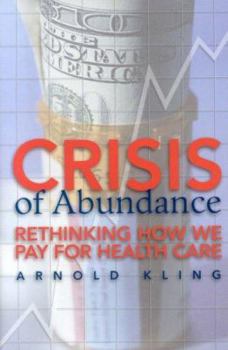Crisis of Abundance: Rethinking How We Pay for Health Care
Select Format
Select Condition 
Book Overview
America's health care troubles stem largely from a great success: Modern medicine can do much more today than in the past. The problem is how to pay for it. In easy to understand prose, MIT-trained... This description may be from another edition of this product.
Format:Hardcover
Language:English
ISBN:1930865899
ISBN13:9781930865891
Release Date:April 2006
Publisher:Cato Institute
Length:110 Pages
Weight:0.80 lbs.
Dimensions:0.6" x 6.7" x 9.2"
Customer Reviews
5 ratings
Excellent
Published by Thriftbooks.com User , 15 years ago
Having been chasing the Health care debate for 15 years, and participating almost as long, I have to say that I was basically underinformed in the past. Roughly, if you haven't read this book, you're not informed enough to participate in the health care debate. Fabulous book. Short, concise, explains the actual problem.
healthcare finance
Published by Thriftbooks.com User , 16 years ago
Probably one of he best critiques of what ails the US healthcare system today. So-called health "insurance" isn't insurance. What is insurable about the risk that I will visit my doctor for an annual physical or my dentist for a cleaning? Why shouldn't I pay these out of pocket and use insurance to pay for what I can't pay out of pocket -- a catastrophic health incident? We get really interested in what we pay for out of our own pockets, but it has to be more than a co-pay or low deducible. Like Social Security, people are not given an incentive to save for the healthcare needs of old age and Kling recommends a tax-exempt account which, if started at age 30 with annual contributions of $1600 and 3% real interst, would accumulate to $100,000 by age 65. At that time the owner would buy a "rest of life" insurance policy for a $25,000 premium with a $75,000 deductible. Medicare is phased out gradually. Make sense? That's why you'll never seen a politician support it. They can only think in terms of government run programs -- the same government that gave us postal "service", Medicare, and a social security programs whose paltry returns would get a commercial annuity manager fired or jailed for pocketing contributions net of payments instead of paying them to a decedent's estate. This is a great book to read in an election year when everyone has a solution to healthcare in America.
Short, Well-Written, and Well-Reasoned
Published by Thriftbooks.com User , 17 years ago
"Crisis of Abundance" should be read by any educated person who wants to understand the healthcare crisis in the U.S. and proposals to remedy it. This short, intelligent book reviews the various theories in play to explain why the U.S. spends so much more (as a percentage of GDP) on healthcare than other developed nations; looks at the "awkward facts" facing each theory; describes the trade-offs that any system for healthcare spending cannot avoid; and presents realistic policy considerations for improvement. Even if you normally don't read "public policy" books, you should make time for this one. It will give you a solid foundation for evaluating what politicians and pundits say about the healthcare crisis and all the different fixes, both good and bad, that will be offered for your support.
Well worth reading
Published by Thriftbooks.com User , 18 years ago
If you've ever wondered why health care is so expensive in America, Kling will fill you in. Despite what many of us believe(d), it's not because of greedy pharmas or wasteful paperwork - as Kling shows, those ideas just don't hold water to explain the obscene cost hikes in recent years. Kling makes a great case that what has caused our problems is what he calls "premium medicine" - or health care spending whose cost exceeds its benefit. As for solutions to our problems, Kling does a good job of unraveling many of the claims made by single-payer advocates, most notably that they can control costs without reducing benefits. And when it comes to his own solutions, I found them to be very sensible (although I think he deliberately keeps them general). For example, he proposes keeping the government involved in funding health care, but ONLY for the poor and chronically ill (unlike in its current form where it also funds the elderly rich). This idea is so sensible - and seems to appeal to those on both sides of the aisle - that I'm surprised we haven't already done it. All in all, well worth the read. Even if you generally don't like libertarian solutions to today's problems, I think you'll find Kling's book very easy to read, with far less ideology than in most other books on anything as controversial as health care.
Almost all you need to understand the healthcare debate
Published by Thriftbooks.com User , 18 years ago
This is a very easy to read book, but contains a wealth of subtle thinking about what's really going on with healthcare. The debate about healthcare is complicated. The underlying economic issues are perhaps less complicated. In fact, there is a little bit of "Emperor has no clothes" aspect of this book in revealing what is really going on. There is a lot of wishful and magical thinking going on in the healthcare debate and you shouldn't read this book if you want to hang on to your illusions about healthcare. Of all the stuff being written on healthcare today, I predict this book will hold up very well and look prescient in ten years.





